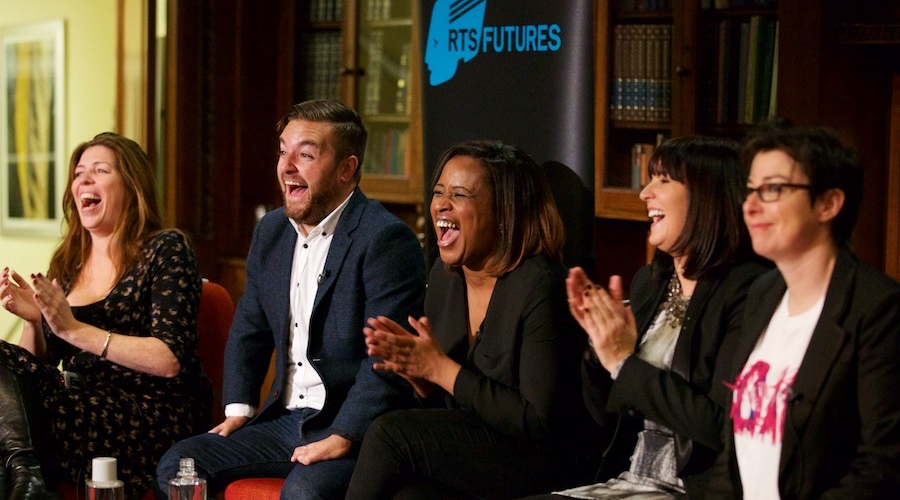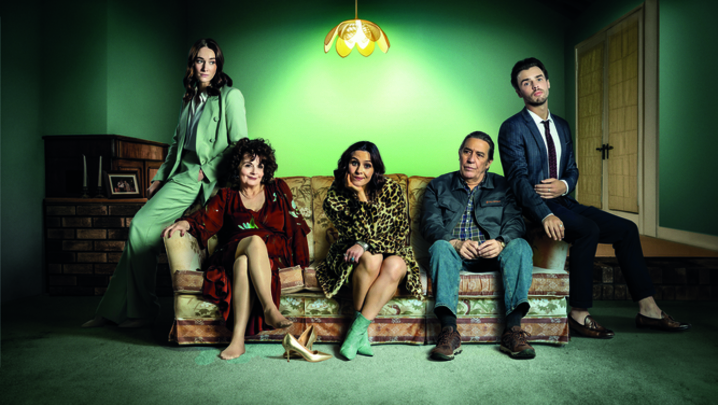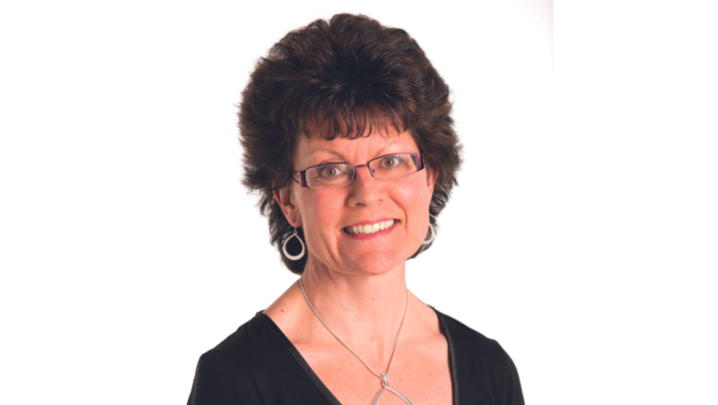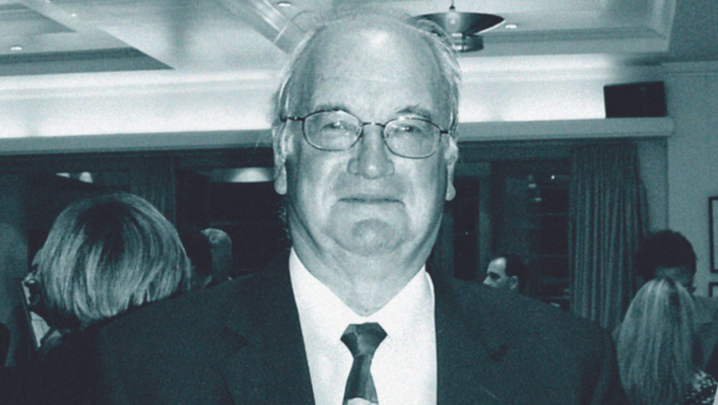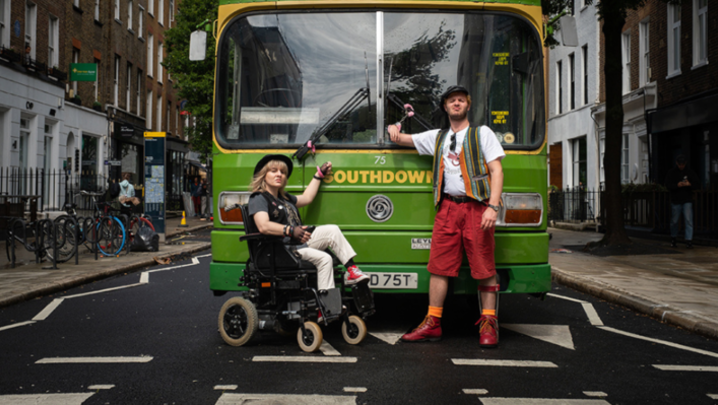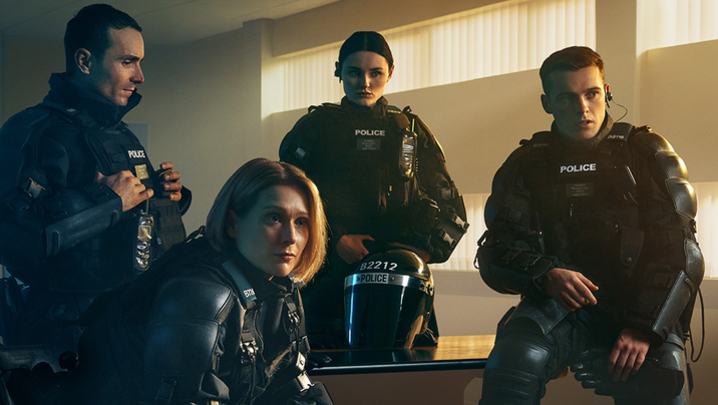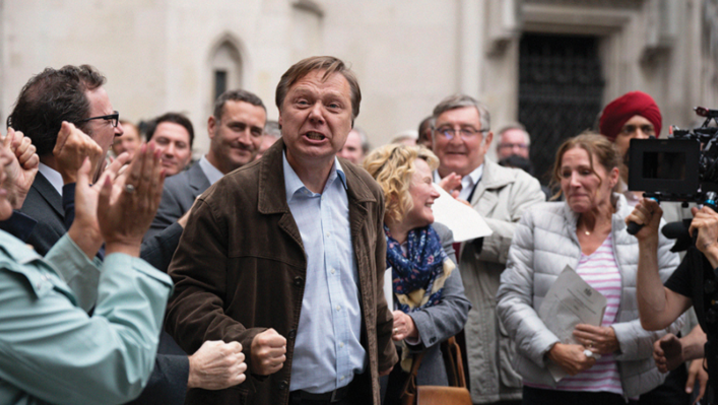Matthew Bell joins would-be presenters to find out what it takes to become the face of a TV programme
"I wish I'd had this opportunity to talk to people who've been successful in television, because it's bloody tough. But, on the flip side, and I know it's a contradiction, it's not as difficult as you may think," said TV game-show host Vernon Kay, as he introduced the final RTS Futures event of the year, "I made it... on screen".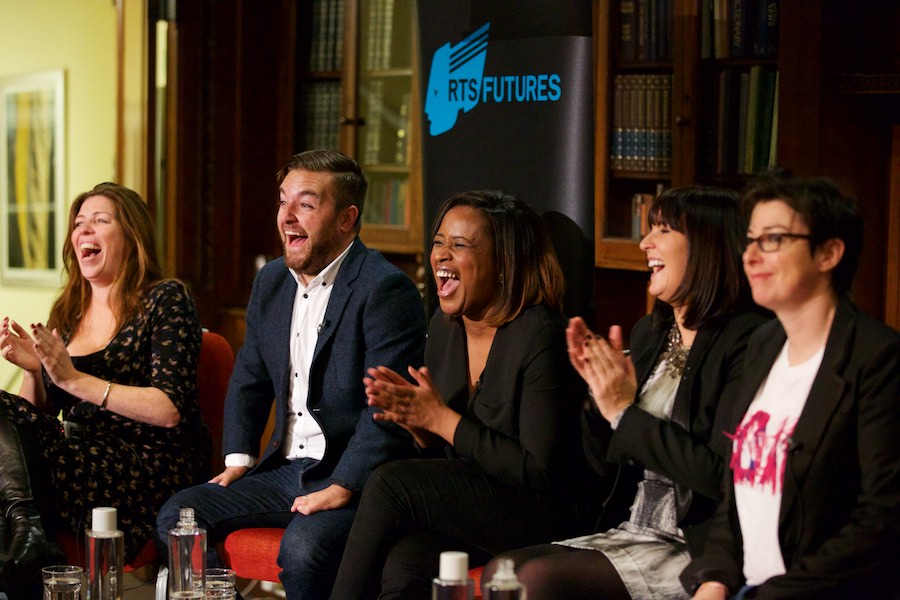 From left: Holly Pye, Alex Brooker, Charlene White, Anna Richardson, Sue Perkins and Vernon Kay (Credit: Paul Hampartsoumian)
From left: Holly Pye, Alex Brooker, Charlene White, Anna Richardson, Sue Perkins and Vernon Kay (Credit: Paul Hampartsoumian)
An all-star panel of presenters plus talent agent Holly Pye discussed working in television with Kay, who chaired the event, offering advice to the many would-be presenters in the large audience. Echoing Kay, their view was that TV always needs new talent and, with the right skills and perseverance, it is possible to break in and build a career.
The presenters were treated to clips of their career highlights and – in stark contrast to the polish of their later work – their uneasy early efforts. "No one starts off being bloody brilliant – it's a learning curve," admitted Kay, who hosts ITV's All Star Family Fortunes.
The co-presenter of The Great British Bake Off, Sue Perkins, watched herself perform a shambolic song and dance routine with Mel Giedroyc and Kylie Minogue from Light Lunch in 1997.
Before working on the Channel 4 chat show, Perkins had already written for BBC comedies French and Saunders and Absolutely Fabulous. Dawn French and Jennifer Saunders, said Perkins, "were amazing mentors and that is something you really need – someone who fights your corner and who gives you the opportunity – because they're hard to come by".
ITV News at Ten anchor Charlene White was shown her small-screen debut, an ITV News Meridian report from 2001 on a pilates course in a church hall. As a child, she recalled, "I wanted to tell stories. TV was never part of my plan – it just happened."
White started early, doing work experience for The Guardian at the age of 16. She worked as a journalist for BBC Radio 1 in her early twenties before a chance encounter with the editor of BBC Three's 60seconds news programme led to a screen test and shifts on the news bulletin.
Having seen a clip of an early presenting gig on ITV sex education show Love Bites, Anna Richardson admitted that her performance and those of the other presenters were "really shit". Addressing the audience, she added: "Don't kid yourself that, just because you do a bit of vlogging or [filming] your own little packages, you're really good. It really does take quite a few years to become good as a presenter."
Richardson had worked in production before landing a presenting role on C4's The Big Breakfast. She said that producers were reluctant to hire new presenters: "There is a suspicion of new talent – unless you've got something exceptional about you or you have some particular expertise."
"Write and put on a show," suggested Perkins, who penned and performed comedy with Giedroyc for many years before appearing on TV. "Edinburgh [the festival] is an amazing place to get seen if you have anything of a comedic bent, or you write sketches or if you have a point of view on the world that would make great stand-up."
Pye, who is Head of Television at talent agency James Grant, argued that it was harder for today's young presenters to learn their trade. Many current prime-time presenters had cut their teeth on children's or youth programmes, which are now less common on the main channels.
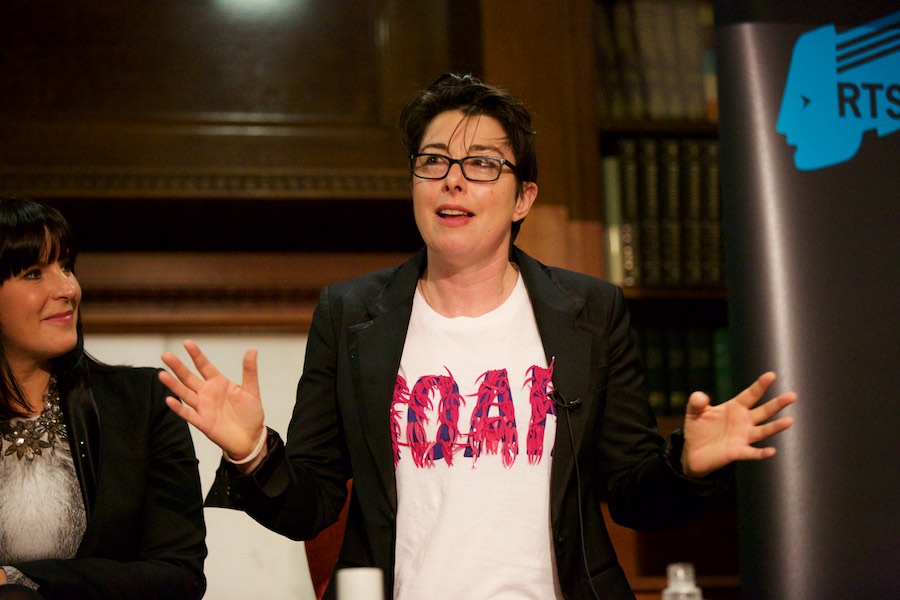 Sue Perkins (Credit: Paul Hampartsoumian)
Sue Perkins (Credit: Paul Hampartsoumian)
"There's a lot of talk about YouTube being the new way, but it's not that easy to make the transition [to TV]," said Pye. "Getting into production and finding ways [to present] through that has probably been more successful."
Nevertheless, plenty of new faces do make it on to the telly. Alex Brooker, the co-host of C4 programmes The Last Leg with Adam Hills and celebrity ski show The Jump, was a football print journalist before he covered the 2012 Paralympics.
The RTS Futures audience viewed his successful audition tape for C4's "Half a Million Quid Talent Search", which aimed to recruit disabled talent to cover the Paralympics. "C4 wanted people with a media background and [who were] disabled," he recalled. "I thought, 'There can't be that many of us knocking about, so I'm in with half a chance.'"
At the Paralympics opening ceremony, Brooker had to interview Prime Minister David Cameron. "I was sick in the toilet before," he recalled. "There's no hiding when you're learning, because you're learning [live] on the telly."
Throughout the evening, the presenters threw out advice to the RTS Futures audience. They were, however, united on one thing. "You have to understand how telly works. I obsessively watch news programmes," said White.
"You must understand the medium," added Perkins. "You can either do that through writing, performing or being involved in production or journalism. If anyone here wants to be on television to be famous, to get girls or to be rich, you're never going to be on TV."
The RTS Futures event, 'I made it... on screen', was held at the Hallam Conference Centre in central London on 9 December and produced by Anna Richardson, James Longman and Rebecca Templar.
Sue Perkins on talent's logjam
'I don't think enough is being done to make the jump from this sort of event, where we willingly and with love, give you whatever the sum total of our experience is – to you actually being on television...
'Where are the younger, brighter, faster versions of me? I can't tell you how much I want to see them, not only because I'm tired, but because I've got stories that are age-appropriate to me that I want to start telling...
'I want to see people bounce around and make tits of themselves during their twenties – lively, vibrant and plugged into a world that I am too slow and stupid to understand.'
Sue Perkins
Vernon Kay on Boys and Girls
'The big learning curve for me was working with Chris Evans on [the 2003, battle-of-the-sexes game show] Boys and Girls – it was my first Saturday-night TV show...
 Vernon Kay (Credit: Paul Hampartsoumian)
Vernon Kay (Credit: Paul Hampartsoumian)
'Chris, and I mean this in the loveliest way, is a TV obsessive and he said, "I want you to learn the script. There's no prompt or cue cards; you'll get the script on Friday night and I want you to learn it by first rehearsal at 10am Saturday..."
'It's the most nerve-wracking thing to be on live telly ... I hit my mark and nothing came out. I stood there thinking, I know it begins "Hello, and welcome to Boys and Girls". So I said that... and literally this whole script vommed from my mouth and I couldn't stop talking...
'And then this ginger penis bobbled underneath the camera. It was Evans; he'd taken all his clothes off.
'He said, "You didn't bat an eyelid when I jumped across [the studio] naked – that proves you know the show."
'And I'm thinking, I just didn't want to look at your knob.'
Vernon Kay

